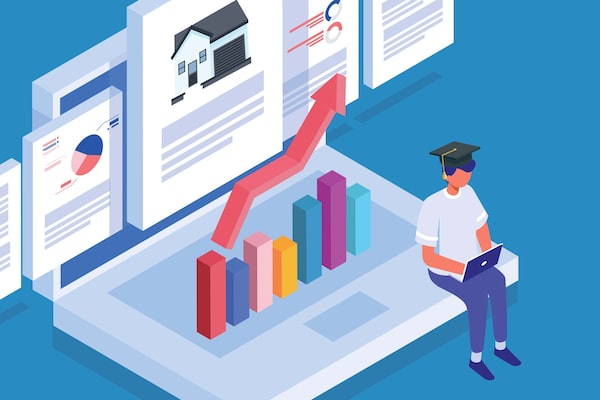
PHOTO ILLUSTRATION BY THE GLOBE AND MAIL/iStockPhoto / Getty Images
Name, age: Nitya, 21
Annual income: $36,000
Debt: $0
Savings: $60,000 in savings account; $3,000 in TFSA
What he does: student; intern at software firm
Where he lives: Brampton, Ont.
Top financial concern: ”I’d like to support my parents – they have 20 years to retirement.”
Most people don’t have $60,000 in their bank account after a four-year undergraduate program. But that’s exactly the situation Nitya, a software company intern and soon-to-be graduate in business administration, finds himself in.
“I wanted to be financially independent and I did not rely on my parents to fund my tuition,” says Nitya, who’s on track to graduate from a Toronto-area business school with a BBA in the spring.
He also relied on numerous scholarships and had paid internships at companies while he studied. During a bank internship this past summer, he worked 10- to 12-hour days, earning a lot of overtime.
By not accruing student debt, Nitya, who lives at home rent-free, allowed his parents to buy a detached four-bedroom home – a major upgrade from their previous house. “We used to live in a semi-detached townhouse. We bought a detached house in a nicer community with a big backyard,” says Nitya. “My parents bought it because my education expenses were so low.”
When he graduates, he will join an investment firm as an analyst with a starting salary of $80,000. With that consistent, higher pay cheque, he plans to dramatically increase the amount he is funnelling into his tax-free savings account. Right now, he’s investing $1,000 every six months.
While his TFSA funds are currently invested in dividend-paying stocks and exchange-traded funds, he would like to be more aggressive should equity prices fall further. He will also weigh joining his future employer’s group registered retirement savings plan.
In the meantime, Nitya hopes to buy a small car to help his younger sister get around. And he’d like to take his family on a trip to Europe before he starts his full-time role next year.
He’s saving by cutting back on meals on campus, playing badminton at his local community centre and going on excursions near home.
In five or six years he’d like to buy real estate with friends. “I’d like to get an investment property in London or Cobourg,” he says. He’d also like to help his parents when they retire. “I’d like to support my parents – they have 20 years to retirement.”
This holiday season, Nitya planned to celebrate modestly. “I’m having a small Christmas with friends,” he says. “I’m cooking rather than going out.”
His typical monthly expenses:
Investment and savings: $2,534
$2,067 to savings.
$167 to TFSA. “I’m in dividend-paying stocks and ETFs.”
$0 to RRSP.
$300 to credit card. “I started using a credit card to build up my credit earlier in 2021. I always pay off all of my debt once it’s due.”
Household and transportation: $124.40
$0 to rent. “I really enjoy living with my parents. I do not pay rent.”
$50 on cellphone.
$74.40 on transit pass. “I made my schedule so I would have classes on three days, and I wouldn’t spend as much money on travel.”
Food and drink: $150
$50 on groceries. “My parents buy most of the groceries but I contribute $50. I enjoy cooking. I prepare burritos, curries. Walmart has been an amazing store. We also go to Costco.”
$100 on dining out. “I love eating out – especially at burger joints, Subway and Tim Hortons. But this costs a lot of money.”
$0 on coffee, tea. “I make camomile tea at home.”
Miscellaneous: $190.84
$54.17 on clothing. “This past April I went to Moores and got a suit and tie – proper work attire. Last month I bought clothes for my sister.”
$10 to sports. “I play badminton at my local community centre and the fee is $3 per hour. Jump-start sponsors this event.”
$100 on dental (teeth straightening). “I’m getting Invisalign.”
$10 on subscriptions. “I’ve got a subscription to The Globe and Mail. I love reading James Bradshaw.”
$0 on books. “I get my books from the local library or find them on university databases.”
$16.67 ($200 a year) on vacations. “This past summer we went to Algonquin Park twice. We rented a canoe and brought all of our meals from home.”
Total: $2,999.24
Some details may be changed to protect the privacy of the person profiled. We want to thank him for sharing his story. Are you a millennial or Gen Z who would like to participate in a Paycheque Project? Send us an e-mail.
Are you a young Canadian with money on your mind? To set yourself up for success and steer clear of costly mistakes, listen to our award-winning Stress Test podcast.